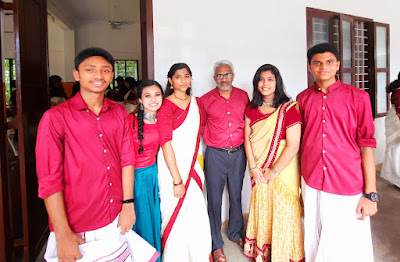Teachers, Students and Humanities
 |
| With some former students |
One of the happiest things in a teacher’s life is former
students contacting after many years to show their affection. It so happened
that two of my former students texted me on WhatsApp yesterday. One of them was
a poet while at school. I once featured her in this same space with one of her
poems, Where
do old birds go to die? Yesterday, she texted me to say, “I wrote
something after ages… Hope you’ll read and let me know what you think.” She is
a student of literature now in a prominent college of Kerala. She has learned
professors of literature as her present teachers. But when she sought the
opinion of her schoolteacher, I had reason to feel proud of myself. And her
story is excellent. Let me give you the link: Wounds.
As I read the last line of the story,
the first question that sprang to my mind was: O my god! Why don’t we have
this sort of students anymore?
I quit teaching precisely because I couldn’t
find the classroom rewarding in any way. Until two years ago, the students were
very different. They liked to listen to what I had to tell them. They participated
in discussions. They voiced their opinions. They had their own views.
Now students don’t seem to have any of
these. They just want to pass the exams and get on with higher studies
preferably somewhere abroad where they will have far better prospects than in
India. A good life, that’s all what they want. Without doing much work. Without
even having to think for themselves. There’s no poetry in their hearts. Even
their brains are in a state of inertia.
A couple of months back, I read in
the New
York Times that the students in America were losing interest in
humanities and hence “universities and colleges are increasingly putting
humanities departments on the chopping block.” Studying humanities is of no
use, a lot of students think now.
It is quite a curious matter that the
students of my last batch were not interested in any subject whatever. Their
math and science teachers made the same complaint as mine. Maybe, this is a
temporary problem caused by the fallout of the Covid pandemic and the students’
romance with their mobile phones during those days. The romance is still
continuing. Maybe, the batches coming up will be different though my wife who
teaches grade nine doesn’t seem quite optimistic about that. Maybe, a lot of
things in the school curriculum have to be consigned to the chopping block.
It so happened that another former
student of mine who is now pursuing her studies in Developmental Social Work in
Canada texted me also yesterday. She also works at a school as an Educational
Assistant. One of the old teachers in Canada told this former student of mine that
the present Indian students lack the standards the earlier one had.
Something is going wrong somewhere,
seriously. I wondered aloud with this Canadian student whether it was because
our present leaders lack any depth: intellectual, moral and emotional.
Everything about them is hollow or fraudulent. Is it affecting the moral fabric
of the nation?
I’m not sure about that. But I’m sure
that when meaningless trumpets are blown day in and day out, the citizens can’t
but go crazy.
PS. The student of
literature mentioned in this post was a science student when I taught her. She
opted for humanities after school. Quite a few of my students migrated from
science and commerce to literature and a sizable number of them told me that I
was the inspiration. I’m proud, of course. But the point I wish to make is that
humanities isn’t marching gloriously to the grave as the New York
Times essayists laments.
A thought provoking write up. The fallout during the Covid Pandemic has not only affected the school students but also their counterparts in college. Let alone studies, they don't even venture out to seek jobs as early as possible. They have given the responsibility to the world and sleeping cozily at home, still in the state of slumber!
ReplyDeleteYes, they it all so easy as if it's the world's responsibility to take care of them. They expect us teachers to award them high grades though they don't do a thing properly.
DeleteHari OM
ReplyDeleteIndeed, there is COVID fallout in education everywhere; as for the humanities, local governments here are so cash-strapped that the first thing to suffer are the arts and crafts. Several council-funded arts programs, theatres, galleries are to have the funds withdrawn - which is tantamount to closing them down... and the PM wants everyone to be brilliant at Maths, which was his subject. There is a lot made of providing choice for the young ones - but the truth is, strong guidance and stable examples are still very much needed, no matter how much they rebel! YAM xx
The youngsters aren't quite willing to accept suggestions and corrections. They think they know better. They rely on their smartphones for counsel and guidance. Maybe, this is a passing phase.
DeleteCovid changed a lot of things. I rather think that students won't stay as cut off as they are right now. I might be wrong, of course, but I believe in cycles. We're in a bad moment right now. People are too focused online and such. But just when you think that's a permanent thing, it'll all change and suddenly people won't be as addicted to the devices as they are right now.
ReplyDeleteI share that optimistic outlook. Something will change, no dout, especially because this can't get any worse.
Delete